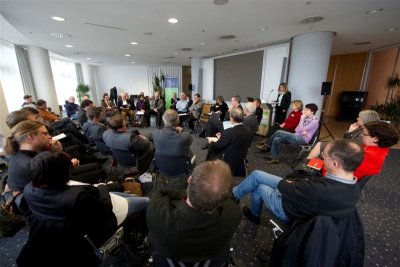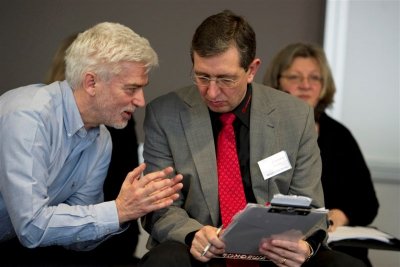Send Article to a Friend
European Commission presents its Strategy at Forum Europe 2010
The European dimension of the Workshop:Fair – especially in the field of vocational rehabilitation and participation of disabled persons in working life – has continually increased. In 2010, BAG WfbM for the first time organized the ‘Forum Europe: Integration in Europe and occupational services in comparison’. The attendants had the opportunity to exchange information on structures of workshops for adapted work and on current trends and developments in the Member States of the European Union.

The Forum Europe at the Workshop:Fair 2010
Guest of honour was Johan ten Geuzendam, Head of Unit for the Integration of People with Disabilities at the European Commission’s Directorate General responsible for Employment, Social Affairs & Equal Opportunities. He presented the future strategy of the European Commission that aims at improving the participation of persons with disability in working life. According to Johan ten Geuzendam, the demographic development and the shortage of qualified labourers increase means, that the market needs every available resource. The economic crisis, that caused serious pressure to public budgets in many Member States, also led to cuts in the rehabilitation budgets of these countries.
Johan ten Geuzendam underlined that the attitude of politicians, employers, service providers and persons with disabilities is generally more important than the actual disability. Children with disabilities receive an education that usually does not prepare them for employment in the general labour market. Therefore, the creation of better educational systems and a life-long assistance are necessary, if this group of persons is to overcome the existing situation. ten Geuzendam also underlined that the European Commission knows that for some persons with disabilities, an employment in the general labour market is not an option. This is the case especially for persons with multiple and severe disabilities. He demanded to re-evaluate traditional ideas of employment to create open educational and rehabilitational systems. The European Commission appreciates the innovative steps taken in Germany concerning adapted employment, such as the creation of workplaces and workgroups for workshop employees in companies of the open labour market.

The Forum was moderated by Wolfgang Schrank und Ivo Lötscher-Zwinggi




The Forum Europe at the Workshop:Fair 2010
Guest of honour was Johan ten Geuzendam, Head of Unit for the Integration of People with Disabilities at the European Commission’s Directorate General responsible for Employment, Social Affairs & Equal Opportunities. He presented the future strategy of the European Commission that aims at improving the participation of persons with disability in working life. According to Johan ten Geuzendam, the demographic development and the shortage of qualified labourers increase means, that the market needs every available resource. The economic crisis, that caused serious pressure to public budgets in many Member States, also led to cuts in the rehabilitation budgets of these countries.
Johan ten Geuzendam underlined that the attitude of politicians, employers, service providers and persons with disabilities is generally more important than the actual disability. Children with disabilities receive an education that usually does not prepare them for employment in the general labour market. Therefore, the creation of better educational systems and a life-long assistance are necessary, if this group of persons is to overcome the existing situation. ten Geuzendam also underlined that the European Commission knows that for some persons with disabilities, an employment in the general labour market is not an option. This is the case especially for persons with multiple and severe disabilities. He demanded to re-evaluate traditional ideas of employment to create open educational and rehabilitational systems. The European Commission appreciates the innovative steps taken in Germany concerning adapted employment, such as the creation of workplaces and workgroups for workshop employees in companies of the open labour market.

The Forum was moderated by Wolfgang Schrank und Ivo Lötscher-Zwinggi
The European Commission has started a study to map the different approaches towards supported employment in all EU Member States. The study will identify and highlight models of good practice and support mutual learning across borders.
The European Commission also intends to develop a strategy for persons with disabilities that is in line with the new economic and social strategy „Europe 2020”. This strategy is the successor of the „Lisbon Strategy”, that was to turn the EU into „the most competitive and dynamic knowledge-based economy in the world, capable of sustainable economic growth with more and better jobs and greater social cohesion“ by 2010. ten Geuzendam assured that the European Commission would examine all proposed Flagship Initiatives (advancement of innovation, education and the digital society; the development of more efficient production processes, while increasing the competitiveness; an increase of employment and qualification as well as fighting poverty). The Commission wants to ensure that aspects concerning disability are considered in all areas of life, such as the social protection system, education, mobility or business support.
Johan ten Geuzendam stressed the efforts of the European Commission to promote the cooperation and the exchange on models of good practice in this field. Within the „European Platform against Poverty”, the engagement of public and private players will be promoted by a transformed „open method of coordination”, in order to work jointly against poverty. The European Social Fund (EFS) will support such intentions.
The European Commission also intends to develop a strategy for persons with disabilities that is in line with the new economic and social strategy „Europe 2020”. This strategy is the successor of the „Lisbon Strategy”, that was to turn the EU into „the most competitive and dynamic knowledge-based economy in the world, capable of sustainable economic growth with more and better jobs and greater social cohesion“ by 2010. ten Geuzendam assured that the European Commission would examine all proposed Flagship Initiatives (advancement of innovation, education and the digital society; the development of more efficient production processes, while increasing the competitiveness; an increase of employment and qualification as well as fighting poverty). The Commission wants to ensure that aspects concerning disability are considered in all areas of life, such as the social protection system, education, mobility or business support.
Johan ten Geuzendam stressed the efforts of the European Commission to promote the cooperation and the exchange on models of good practice in this field. Within the „European Platform against Poverty”, the engagement of public and private players will be promoted by a transformed „open method of coordination”, in order to work jointly against poverty. The European Social Fund (EFS) will support such intentions.




























